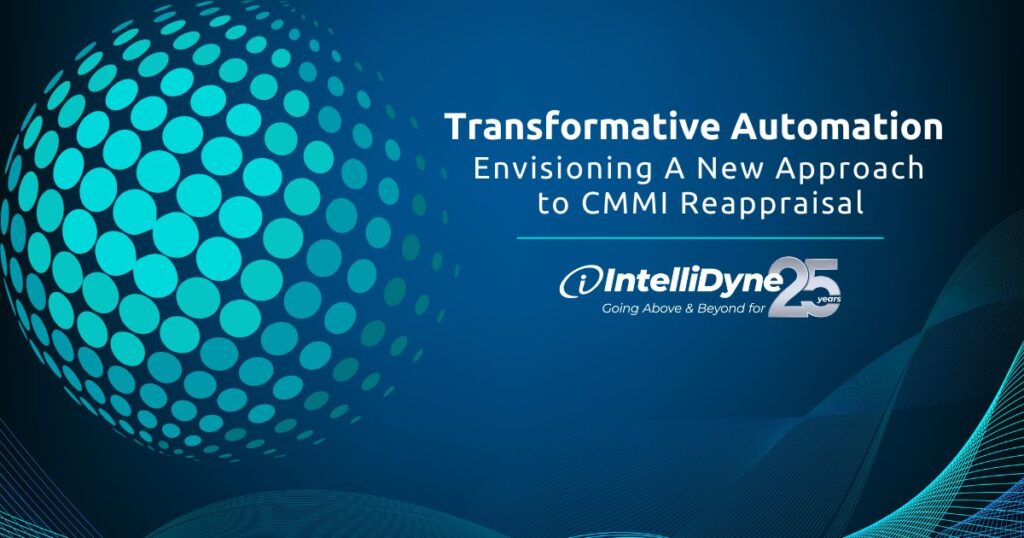If you’re an information technology (IT) supplier to the federal government, maintaining your Capability Maturity Model Integration (CMMI) appraisal in good standing is top of mind and essential to doing business in the federal marketplace. Like International Organization for Standardization (ISO) in the private sector, CMMI appraisal is required to do business with some government agencies and is a mark of your organization’s dedication to best practices, capability maturity, and continuous improvement in business performance. The CMMI maturity level is a competitive differentiator on many government programs, and more than ten thousand companies globally adhere to the CMMI framework.
However, the appraisal is not a one-time stamp of approval. CMMI benchmark or sustainment reappraisals can be an administrative challenge involving a significant burden to prove adherence every two to three years. Auditors require documentation of ongoing process implementation, from completed forms and meeting minutes to training records and other evidentiary data. While the CMMI appraisal may only take a couple of weeks, the preparation for an audit can start up to six months in advance. For IntelliDyne’s CMMI Level 3 designation, the 2022 audit involved 16 people consuming 1,600 employee hours, including a core team, support, and executive staff.
The Future of CMMI Audit Prep
Enter artificial intelligence (AI) and intelligent automation (IA), a combined way to transform CMMI audit preparation. Using automation tools and cloud-based platforms with pre-built workflows specifically designed for CMMI compliance, we can leverage AI to streamline audits.
- Retrieve data faster from multiple sources. In many organizations, audit data is stored in siloed SharePoint or JIRA repositories, which lack the power of a structured database to categorize and trigger commands.
- Alleviate the burden of summarizing massive amounts of data. Not only does AI summarize data quicker, it analyzes it with fewer errors.
- Send notifications of noncompliance or when missing elements are detected.
- Improve searchability of evidentiary data across multiple platforms, thereby reducing time and apprehension at audit time.
- Generate reports and visualizations, such as presentations and dashboards, for ease of explanation to auditors.
Software as a Service (SaaS) applications with AI-embedded capabilities like automated categorization can help organizations handle the mountains of paperwork associated with any audit and even generate summary documents for your CMMI appraiser.
Workflow Automation for Compliance Needs
IntelliDyne specializes in IT infrastructure management and develops solutions, such as workflow automation tools, to address specific needs. Automation can alleviate many of the administrative burdens of CMMI compliance, such as:
- Manual data entry
- Document generation
- Record-keeping
- Evidence assembly
- Gap analysis
- Control board configuration
- Planning and estimation
- Monitoring and control
- Performance management and improvement
- Resource allocation and scheduling
Streamlining CMMI compliance activities frees up organizations to focus on process improvement and core development activities, rather than checklists, templates, and other paperwork. In addition, integrating new technologies or methodologies may necessitate revising established CMMI-aligned processes. These factors can make reappraisals just as demanding, if not more so, than the initial CMMI assessment and appraisal.
With minimal development effort, IntelliDyne designs and deploys low-code applications and integrates them with a client’s existing IT infrastructure. For example, IntelliDyne’s proprietary Dashblox Integrated Program Assurance (IPA) is an enterprise portfolio and program management solution that consolidates data from multiple systems into a single, seamless, and real-time dashboard for increased transparency and accountability. A CMMI audit management solution would model IPA to transform the existing audit process, not only to automate the generation of output data but to illustrate the use of agile methodologies to assure delivery of superior products, systems, and solutions.
The Benefits of Transformative Automation
Transformative automation is a game changer with three primary benefits:
- Increased Efficiency & Productivity: Freeing up employees for more strategic work.
- Enhanced Decision-making: Data-driven insights for better policy formulation.
- Improved Citizen Services: Faster response times and personalized experiences.
CMMI appraisal already speaks to your organization’s quality and efficiency, giving you an edge over competitors who haven’t undergone the rigorous assessment process. By applying and embedding AI and transformative automation in your business processes, you can improve efficiency, accuracy, and risk mitigation in managing performance aligned to business objectives and customer requirements while achieving faster CMMI appraisals and deeper insights for return on investments in continuous improvement and quality policies.

